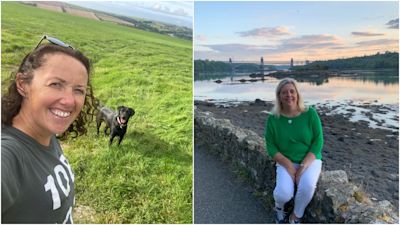Third of women in Wales consider giving up work due to menopause symptoms

Report by Dot Davies and Producer Siân Thomas
"I don’t want to suffer in silence anymore. We must have this conversation now."
For the last year, presenter Dot Davies has been experiencing the symptoms and side effects of the early stages of menopause - known as the peri-menopause.
“It started about a year ago with waking up in the night, unable to go back to sleep, fever, lack of patience, and headaches."
"I noticed that I couldn't cope with my busy life. It was all getting too much, I was forgetting a lot and I realised that I needed help."
Dot is just one of 13 million women in the UK living with symptoms of the menopause and peri-menopause.
What is the menopause?
The menopause marks the end of a woman’s menstrual cycle is a natural part of ageing that usually occurs between 45 and 55 years of age, as a woman’s hormone levels start to decline.
Symptoms include hot flushes, heart palpitations, joint aches and memory loss.
As a TV and radio presenter, she says she was “worried” about the effect it could have on her ability to work.
“I was having brain fog, couldn’t concentrate, going blank in the middle of an interview. I was getting really stressed.”
A survey conducted by ITV Cymru Wales found that more than a third of women said they have considered giving up their work because of their menopause symptoms.
Meanwhile, 60% say their symptoms have had a negative impact on their work, with 25% saying they did not feel supported by the workplace while experiencing menopause symptoms.
Alwen Watkin, 53, from Anglesey, decided to give up her job as a secondary school headteacher.
She says the menopause was one of the reasons she decided to leave.
She said: "I could go weeks on end without sleeping at all. Tasks I was used to doing took longer to do. And all of a sudden I couldn’t string a sentence together and that was actually frightening because at one point I thought I was going mad.”
"The menopause was one of the factors in my decision to give up my career. I didn't feel I could perform at my best."
"There's no understanding of what people were going through either. In the profession that I was in, there were a large number of men in leadership roles.”
"People don't know how to deal with it, and I think there may be an element of shame."
After being in the education sector for 31 years, Alwen recognised it would be a huge change, both practically and financially.
"Going from having a stable good pay to a situation where someone doesn't bring in income is difficult.
“Obviously my family was very concerned, it was a big decision to make. I had financial commitments, a mortgage, a daughter to get through uni and so forth so they were very concerned.
“But my family has noticed a change in me already. My 19-year-old daughter said ‘I’ve had my mum is back’ and that’s so important to me. Life is just too short.”
Consultant Helen Bayliss runs a specialist menopause clinic at Cwm Taf health board and says conversation needs to happen if we are to see change.
“If men were to understand menopause as well as we did, we wouldn’t have these issues. We wouldn’t have these stigmas, menopause would be talked about in the work place as well, menopause would be talked about in schools as well.
“All health boards need to understand that menopause is an issue and it’s not going away. Those services need to be at our front door and that everyone can access them.”
As part of the programme, Dot also visits the 'Menopause Doctor' and expert, Dr Louise Newson. She has nearly a quarter of a million followers on Instagram and has treated women from all over the world at her private clinic in Stratford Upon Avon.
She says that she was shocked by how many women from Wales, and from other parts of the UK, travel to her specialist clinic.
“Quite soon I opened my clinic a few years ago, we were seeing quite a lot of people coming across the border, and I was like why are they travelling all this distance?
"They travel from Scotland, the South Coast and on my social media I’ve got people from all over the world.
"It looks like I’m doing a really good job here, but deep down I’m really sad. I’m really sad on behalf of women who are suffering all the time.
"If men were suffering in this way it wouldn't be this hard. So there is a complete gender inequality and I think it's about time women were listened to."
Wales This Week: The Menopause Taboo will air on Wednesday November 10 at 8pm on ITV Cymru Wales. It will also be available to view online shortly afterwards at itv.com/walesprogrammes